I’ve been thinking a lot about the continuing toll of deaths, damage, and injuries from traffic crashes in Portland. Beyond the clear statistical rise in fatal crashes — including a confirmation I received this morning from the City of Portland that the 13 deaths on our streets in July were the most ever since at least 1993 — my spidey senses have been tingling for months as numerous people have posted about and/or messaged BikePortland about seeing or being involved in a serious crash.
And what’s with all the people who manage to flip their cars on relatively low-speed, neighborhood streets?
Bottom line is this: It’s very scary out there. People can feel it. And we’re on the precipice of a negative feedback loop where fewer people feel safe walking and biking, and more people feel safe driving fast, drunk, and without regard for others, which leads to fewer non-drivers using our streets, and so on.
Part of how I process my sadness and frustration about what’s going on is to analyze the crashes where someone dies. So far, I’ve been pouring over the list of 43 people who’ve been killed using our streets so far this year.
While in previous years alarms rang due to a rise is pedestrian fatalities, so far this year driving and motorcycling is where the most pain is being felt. Of the 43 fatalities, there have been 20 drivers and 8 motorcycle riders — about the same number of deaths from those modes we typically see in an entire year.
Here are a few other takeaways about where things stand:
A very violent summer on our streets
Of the 20 people who’ve been killed on Portland streets since the start of summer (June 4th to present), 16 of them died because someone committed a crime while driving. I haven’t done an exhaustive investigation into each crash, but from what I’ve read in Portland Police Bureau crash statements, there were: three hit-and-runs, 10 involved speed, eight involved alcohol, and at least five involved speed and alcohol.
Think about that for a moment. The fact that these behaviors are so rampant underlies the importance of taking a systemic, public health approach to our traffic safety crisis. Yes we need to fortify and defend our streets and public spaces from the scourge of these drivers, but I don’t want to live in a place where we are locked into an arms-race between vulnerable people and cars.
July was absolutely brutal. 13 deaths is the most in a one-month span for over 30 years. There were two multi-fatal crashes where five people died — and four of them were teenagers. Of the nine victims ages we know of, six of them were 21 years or younger. One of the victims in a separate crash was just 11 years old. And it wasn’t just Portland. The Washington County Sheriff’s office issued a special statement about the “particularly dangerous month.”
This should be an all-hands-on-deck moment
A story from Street Roots published Tuesday got it right by centering the leader of the Multnomah County Health Department’s disease prevention and health promotion unit. To get a handle on this epidemic of criminal driving behavior, poor choices, and the tragic consequences they lead to, we’ll need to zoom way out from the Portland Bureau of Transportation and the usual advocacy folks.
We need all-hands-on deck: local, county, regional, state, and federal agencies. And we need more than urban planners, traffic engineers and transportation advocates. We need health officials, law enforcement experts, community leaders, elected officials, and so on to engage and understand the urgency of what’s happening out there.
We need local leaders to step up. ASAP.
When two bicycle riders (and very nearly a third) were killed in two weeks in October 2007, a former Portland mayor called an emergency press conference and invite-only meeting with all the powerful players in city hall. After that event city council immediately coughed up $200,000 which was used for a new bike safety treatment called “bike boxes” (that have since become a PBOT toolbox mainstay).
Then again in June 2015, when several high-profile collisions involving vulnerable road users happened in short succession (including one man whose leg was ripped off by a driver on SE Powell and 26th), a Portland mayor and PBOT commissioner called another emergency meeting in City Hall. Less actionresulted from that one, but it still put the issue of safe streets squarely in front of Portlanders citywide.
What just happened in July must be met with an even stronger response. Despite nearly two decades of commitment to safe streets and 8 years into a “Vision Zero” pledge, we are on course for an all-time record number of deaths. I don’t care if people are dying on bikes, on foot, or in cars; dangerous streets and the selfish, unhealthy people who use them, are sucking the life out of our great city.
The time for plans and promises and pointing fingers has passed. Who will take substantive actions and give me something to write instead of just another op-ed? I’m waiting.
Note: Please keep in mind the number of cycling fatalities has (thankfully) remained very low. There have been zero biking deaths so far this year (knock on wood). And since 2018 we have averaged 2.6 per year. I think because BikePortland covers this issue so closely and tends to be a loud voice in traffic safety conversations, some folks assume incorrectly that bike deaths are spiking too. That is not what’s happening.




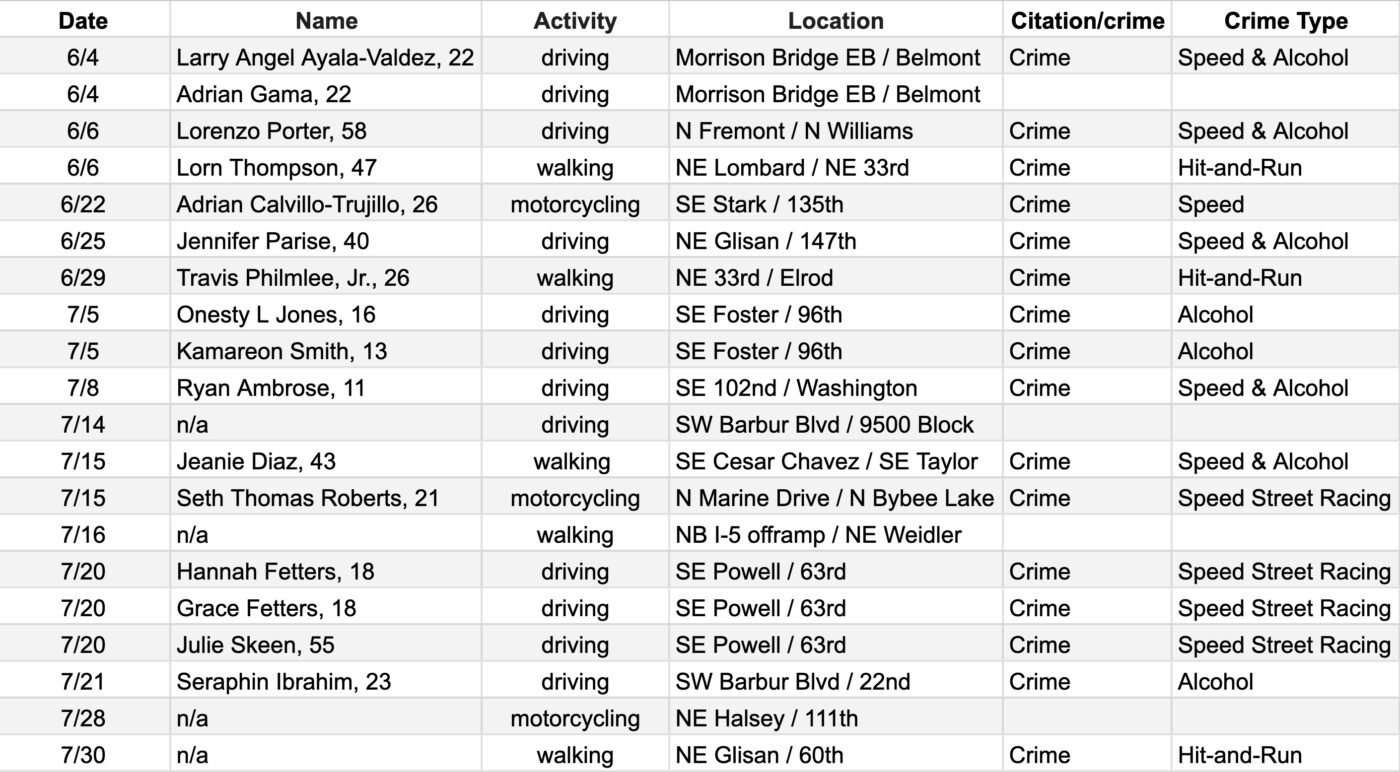
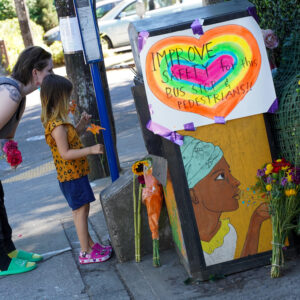
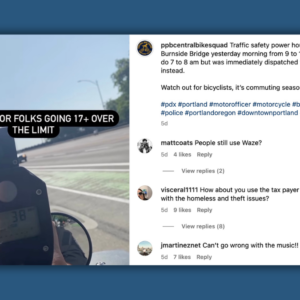
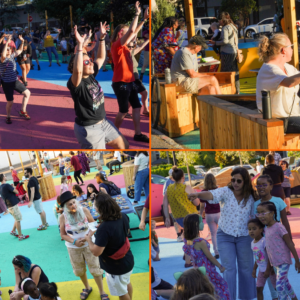
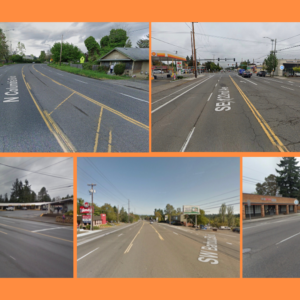
Thanks for reading.
BikePortland has served this community with independent community journalism since 2005. We rely on subscriptions from readers like you to survive. Your financial support is vital in keeping this valuable resource alive and well.
Please subscribe today to strengthen and expand our work.
Gosh, I wonder what changed?
https://www.portland.gov/wheeler/news/2021/6/22/mayor-and-police-chief-announce-ppb-will-change-traffic-enforcement-consent
Yes. Police not doing their jobs and putting politics above safety by telling the public that they aren’t enforcing traffic laws was a very bad decision that has had vast negative consequences.
For Portland to have the average number of police for a city its size, it would have to more than double the number of officers working for the Police Bureau. This is not about “police not doing their jobs and putting politics above safety.” It’s about not having enough police to provide basic law enforcement functions.
That assumes a fact not in evidence, which is that other US cities’ police levels are right for their size. We have approximately the same number of police per capita as San Diego, San Jose, Bakersfield, and Sacramento. Do they have too few? Too many? What is the right number of police per capital and what are we basing that off of?
Blaming the cops is the easy out Jonathan. Our elected officials oversee our civilian law enforcement. Vote differently if you want change.
i voted for JoAnn Hardesty and Wheeler assigned her to PBOT, not the police. It is not just about voting. It is about enforcing laws regarding the deadly weapons that cars/trucks are
Here are some orange barrels. They’ll surely send a strong message to the teenagers firing stolen guns from the window of a stolen Kia.
“‘I would not say the barrels by itself stopped anything bad from happening, but it was the community coming together saying, “If we work together, we can figure this out,”‘ Hardesty said during a news conference outside of the Mt. Scott Community Center. ‘I used the bureaus that I have in my portfolio to actually address the critical issues that we’re facing today.'”
https://www.oregonlive.com/portland/2022/03/se-portland-neighborhood-sees-64-drop-in-shootings-amid-traffic-calming-program-commissioner-jo-ann-hardesty-says.html
Seems pretty reasonable, actually. Unlike, say, holding Hardesty uniquely responsible for a city department (PPB) she was never in charge of.
“‘I would not say the barrels by itself stopped anything bad from happening, but it was the community coming together saying, “If we work together, we can figure this out,”‘ Hardesty said during a news conference outside of the Mt. Scott Community Center. ‘I used the bureaus that I have in my portfolio to actually address the critical issues that we’re facing today.'”
https://www.oregonlive.com/portland/2022/03/se-portland-neighborhood-sees-64-drop-in-shootings-amid-traffic-calming-program-commissioner-jo-ann-hardesty-says.html
Sounds pretty reasonable, actually. In comparison to, say, holding a city councillor uniquely responsible for the actions of a bureau (PPB) she was never in charge of.
I keep hearing this claim from leftist ideologues but nary a single one has gone the extra step of citing any sort of evidence. No, biased personal dislike of cops doesn’t count; neither does the invocation of George Floyd’s murder several thousand miles away.
So let’s see the evidence, Jonathan.
Only a signed notarized letter from cops saying they’re not doing their jobs counts, clearly.
When the only evidence you would accept is the words of the cops themselves, you’re not going to find any evidence they’re doing anything wrong. You’re blind to what’s right in front of you.
If you really care about resolving the traffic deaths issue, one should look past this non-sensisical hypothesis that police are choosing not to do their job. While ignoring governance and a population spent years screaming “ACAB”, dismantling the traffic enforcement division, chased out town 40% of police force, and a DA that often chooses to not prosecute criminals.
I’m not ignoring anything. I don’t think it’s “nonsensical” at all to question the political motives and actions of some PPB officers. There are countless stories from folks who’ve called them and asked for a report or an officer’s attention, only to be told that they aren’t able to respond and that folks need to call city hall. It’s also a fact that they went out of their way to broadcast to all Portlanders that they would not enforce traffic laws – an extremely dangerous and irresponsible decision that was done only to score political points. You have to have your head in the sand if you think the PPB and their union have not played politics in these last few years and that they are trying to make Portland feel the pain of the 2020 protests where PPB were told nonstop “ACAB” “defund the police” etc…
It’s funny how people are criticizing me for pushing a narrative while responding by pushing a narrative of their own. We all have our narratives! I have an opinion based on my own experiences and that of others. You can disagree. That’s fine. But I think PPB has some major issues beyond not having enough staff or money and until they prove to me that they’ve changed a lot they will not fully have my trust. Does that mean I hate all police and want to abolish the PPB? Nope. I’ve never ever said that. I just think we need to be more skeptical of them and their role in our city and we need them to play by the rules and be better stewards of our tax dollars.
Hear, hear!
This also happened to me. It was several years before COVID, and the officer I was asking for help had obvious sympathy for my complaint, I had a good relationship with him, and he had grown up in the neighborhood so had a fondness for it and knew it well. This response had absolutely nothing to do with not wanting to do his job professionally and proudly.
Not everything needs to be interpreted in the most nefarious light possible.
And to be fair, you didn’t trust PPB even before the current troubles; I recall a story you wrote describing your conflict over breaking off communication with an officer you had a good relationship with for no reason other than he worked for the PPB.
This position is revisionist history and if what you’re saying is true, there is no way the quote below from Jo Ann Hardesty would have portrayed the decision this way:
It’s no secret I’ve had disagreements with Mayor Wheeler and Chief Lovell as to how we as a City respond to this unique moment in history demanding racial justice and transformation of community safety. However, when the Mayor and PPB make good decisions, they will have my full support and this is one of those occasions. Thank you Mayor Wheeler and Chief Lovell for this significant change that will advance the cause of racial justice in policing.
I strongly support today’s announcement that PPB will no longer pursue minor traffic violations and will limit car searches, while informing drivers of their constitutional rights during these encounters. This allows the police to focus on traffic violations that pose an immediate safety threat and other higher priority crime mitigation efforts, such as solving crimes related to the increase in gun violence.
Historically across the nation and here in Portland, traffic stops have led to unjustified police violence that have too often turned deadly for Black, Indigenous, and all Communities of Color. Even less violent encounters have contributed to a feeling of being profiled and thus losing trust in law enforcement – feelings supported by the data that shows Black people make up a disproportionate rate of traffic stops here in Portland.
This is another positive step in the right direction and I want to thank the community that set these expectations for change through 150 days of protest last summer. The work continues and we will need your continued engagement to rethink community safety for all.
https://www.kgw.com/article/news/local/portland-mayor-police-chief-news-conference-policing-changes/283-7c4e2427-d844-440e-acad-ed0e46e68a8d#:~:text=PORTLAND%2C%20Ore.,recording%20a%20driver’s%20informed%20consent.
The PPB was pressured to make these changes and all but the vocal minority pushing for them could have explained the unintended consequences this would present.
“Minor traffic violations” did not include moving violations.
Disbanding the traffic division came later.
cameras work.
Yes, cameras can be effective for speeders but often NOT on drunk and drug impaired drivers. AND they don’t work on the dangerous ghost cars without license plates. I support increased camera enforcement but we must remember cameras are NOT a panacea despite it being touted as such. Police traffic traffic enforcement is a required element in a safe city which Portland is not.
Ah, fortunately there is a very large overlap in these behaviors, i.e. those who DUI, fail to yield, etc. very frequently also… speed. So while speed cameras only measure speed, they still are incredibly effective at identifying a lot of people who use autos in unsafe manners. In NYC whenever someone kills another person with a car their license record via howsmydriving can be checked. It is often the case that they have a dozen or so speeding tickets. (There is technically a driver abatement program, but it currently doesn’t work)
But you are correct; police have some role. In NY and NJ the market for fake temp licenses (and purposely obscuring licenses) is incredibly lucrative, and both lawmakers and police are playing a role in attempting to solve this problem.
Oregon should be leading on legislation to require repeat speed-limit offenders to install speed limiters on their vehicles.
https://www.govtech.com/public-safety/new-york-lawmakers-want-to-mandate-devices-to-slow-speeders
This just isn’t that complicated.
Since the riots we have decided that enforcement of our laws is not a “Portland value”. It’s been decided that social norms are less important than then an individual’s rights to do what they please.
Lawlessness has spread to everything from traffic violence to petty theft to car theft to vandalism to environmental destruction of our city. We ended up understaffing our police department to such a degree that eliminating traffic enforcement was needed to achieve minimal staffing. And then somehow eliminating police response was going to promote racial justice? Huh?
The local transportation advocates and nonprofits have been SILENT on the issue of the dangers of lack of police enforcement and street side camping because it’s not “politically correct” in Portland. Anyone who raised these issues (until recently) was ostracized as some right wing “law and order” militant. It has been ideology trumping common sense in Portland since Floyd.
Joanne Hardesty laughingly spent lavishly on plastic traffic barrels and wands to safeguard us from traffic and gun violence. And then 40+% plus of voters supported this idiocy at the time of the last election.
Even these past few weeks commenters on Bike Portland have focused on infrastructure improvements as the only solution. Yet we know well and good that our infrastructure is slightly better than before the rampant increase in traffic related fatalities and injuries.
It’s NOT infrastructure that caused this problem and NOT everywhere is having this same level of violence.
We need voters to demand concrete, proven, rapid changes to the way we approach enforcement of our traffic laws. These laws were created by our community to protect us. Until such time that our elected leaders will act to enforce them, the carnage will continue.
Yes – concrete changes.
These murderous accidents happen in an instant; we could quadruple the police force and still there can’t be enough cops to preclude and stop people from making errors while driving cars, whether from speeding, drugs, alcohol, cell phone distraction, etc. That’s a reductionist fantasy, I’m afraid. Portland’s streets are incredibly dangerous and totally centered around the car; check out this video to see what smart changes to our streets could look like and accomplish.
“there can’t be enough cops to preclude and stop people from making errors while driving cars”
This is 100% true, and also completely irrelevant. The goal isn’t to stop people from making “errors while driving cars” , The idea is to deter at least some of the most egregious behavior. Some people will be deterred by the prospect of getting caught driving drunk, for example, and will not do it. Some people will continue to do it, even with plenty of cops on the street.
The idea is to reduce the magnitude of the problem, not eliminate it completely.
This approach can be done in conjunction with other approaches, and could eventually be phased out as other approaches are implemented and prove successful.
Comment of the week.
“It can’t be the infrastructure!” [screaming while standing in the middle of Bogota]. Because if 100 years of enforcing traffic laws has told us anything, it’s that we just need to try harder doing it.
“[Jo Ann] Hardesty laughingly spent lavishly on plastic traffic barrels and wands…”
What did you want her to do, use dump trucks as paddy wagons? Hardesty was in charge of PBOT, not PPB. If you didn’t like that, blame the mayor.
I think it’s fair to say that if Ted Wheeler isn’t a terrible mayor full stop, then, he is, undoubtedly, a terrible mayor in a crisis. Portland couldn’t have wished for a more ineffectual, disengaged, and uninspiring leader these past few years.
So, it should be no surprise that he won’t blare a clarion call this summer for tangible action. He’s the mayor who in February 2022 described the death toll on Portland’s roads in 2021 as “devastating statistics,” but has failed to elucidate a clear response to this devastation.
There may be myriad reasons that this city has not stemmed the violence on our roadways which makes “Vision Zero” a sick joke, but it can’t help when the city’s mayor is a bystander.
Still light years more competent than his opponent.
(I’m going to stop mentioning her by name because, like Trump, invoking her at all just keeps her relevant. And she’s someone who, also like Trump, has no business in politics.)
What could he do within his powers as Mayor that would satisfy you?
Here’s Telegraph Ave in Oakland after many years of debate, hiccups, confusion, complaining business owners, advocacy (by business owners), and many interim designs. Sure, the last part is the part that gets the news/attention (capital project that costs a lot), but the project started with planters and the decision to make the street safe. If you want this death spiral to change, shoe gazing/bellyaching is not the answer: email BikeLoud, ask Mapps, the mayor and our new PBOT director to redesign a specific street with planters and whatever they can. We have the means, we just don’t have the will yet.
With all due respect, “emailing” an org* that shies away from even the hint of confrontation with power is not much better than shoegazing.
*what, exactly, is the intention here?
I went to college in Eugene 1986-1991 and lived in Portland 1997-2015, and from what I observed, I severely doubt that Oregonians in general and Portlanders specifically, actually want good centralized stable government. They certainly don’t want to pay taxes, particularly to adequately fund police and transportation. They resisted water chlorination forever until the feds forced it on them, and they still debate fluoridation as a communist plot. I’ve met many Oregonians who view high drug addiction rates and traffic deaths as an acceptable price to “preserve their personal freedoms”, since clearly so many treat the commons as their personal trash (during good times) or camping site (during mass homelessness). So many come from out of state, seeking a tax haven and the illusion of freedom in the state, and Oregon continues to deliver – low taxes, no sales taxes, legalized drugs, 75 mph speed limits, concealed guns, you name it – with an extra-liberal state and local governments.
Meanwhile, here in NC we get lots of Oregon and Portland refugees, eager to buy our cheap property and pay 4.5% state income taxes, but dismayed about our very conservative state and local politics even when Democrats are in charge, and our huge well-paid Gestapo police departments.
Be careful what you ask for…
There is not a single mile of road anywhere in Oregon with a 75 mph speed limit. When you moved away, there was not a single mile of road anywhere in Oregon with even a 70 mph speed limit. When you moved away, even 65 was quite rare, limited to a handful of major rural highways and interstates. If you can get this simple fact so wrong, it makes me worry that the rest of your analysis is equally sloppy.
I think he got it about right.
This is as simple as enforcing traffic law. Methodical targeting of high-offense zones focused on commuter arterials would be an easy and high-impact place for PPB to start. Set up a sting for a week, write 100 tickets, and then move on. PPB continues to erode even the illusion of consequence for reckless behavior when they publicly announce things like, “yeah traffic stops are back on but only between the hours of 5pm and 3am”. PPB’s apathy and Wheeler’s impotence is not sustainable if Portland hopes to hang out to it’s last fraying threads of livability.
Our car-centered infrastructure promotes the kind of deadly use we are experiencing; more police won’t change that. This video shows what livable city design is all about.
It’s laughable that people think that the police are itching to enforce traffic laws and that a progressive cabal is holding them back. If it is not clear by now, the police, like many people, want to be paid as much as they can for doing as little as possible. They also want to act with impunity and not be held responsible for their mistakes. They are just normal people with stressful jobs. Add to that a very strong union, a weak commissioner and a unifying dislike for much of Portland.
The reason many people are looking beyond the police for solutions is because “enforcement” costs too much, the police aren’t good at getting it right, and in many places with the highest number of traffic deaths there have been no limits on enforcement and this has not translated into decreased deaths. In a monster-truck-based transportation system built for speed, enforcement is a fantasy, much like a highly competent, fair and professional police force. The “tough on crime” fervor in Portland politics has been mostly oversimplified talking points that has rallied a lot of suckers; now just yelling into the void about more enforcement as if it is someone’s fault other than the police, themselves. Guess what, it has been their fault the entire time.
Should the police do their jobs and stop people from breaking the law without breaking the law themselves? yeah. Would they rather get paid 100k to sit in an air conditioned room and look at red light camera videos? yeah. Are bollards, jersey barriers and infrastructure that has been successful in other countries cheaper and more effective? also yeah.
The other way to approach this would be to have real regulation of car and truck use that limits them to practical, good-for-society functions before they end up in people’s hands. However, in the US that seems like an even bigger lift, because of the induced fetishization of every American’s sacred right to drink from the firehose of over-consumption like a goose making foie gras.
A truly worthy comment of the week.
Another fantasy that some hold is that technology will save us from this behavior. Fantasies all around.
So let me get this straight: the majority of those killed have been drivers (with very few cyclists), yet the public has responded by driving more? The ability of Americans to defy logic never ceases to amaze me.
One infrastructure idea: Most of the deaths are due to excessive speed (and yes, often combined with substance abuse by people who often have a revoked license and/or are driving a stolen car and are almost certainly uninsured). Excessive speed is most problematic on our stroads (82nd, Powell, 122nd, Cesar Chavez, MLK, Lombard, etc.) Obviously, posting a lower speed limit without enforcement isn’t working. So lets get rid of stoplights at every stroad intersection and replace them with roundabouts. It works in Europe, and it even works in Bend and Vancouver. If you don’t have a straight stretch of road – stoplight or not – you simply can’t speed. I know this is an expensive fix, but obviously road engineering is part of the problem. If you want drivers to drive 25-30 mph, you can’t expect compliance on roads where they can easily reach 80.
Roundabouts require much more space than those intersections have so you’d have to buy the surrounding properties at every intersection. “Expensive fix” is a bit of an understatement.
Reasons why we can’t do anything are a dime a dozen. Get in line behind the rest of them.
I’m not saying we couldn’t do it. I’m just saying we couldn’t afford it.
Yeah I know, reality is such a bummer.
But apparently we can afford 43 people killed by drivers so far this year. Is this really a math problem?
Yes, it really is. Budgets are a thing. I didn’t just make them up to be contrarian.
What is the value of a human life for budgetary purposes? Asking for a friend.
Not true. A standard USDOT “urban single-lane” roundabout measuring 100 feet curb-to-curb would fit comfortably within the existing intersection at SE Powell and 82nd, to use one example. Using an “urban compact” design (80 ft. diameter) would leave plenty of room for a raised and/or buffered bike lane as well.
https://www.fhwa.dot.gov/publications/research/safety/00067/000671.pdf
Thank you again for the informative write-up Jonathan. Information is one of our precious few tools against chaos. So thanks for providing it in an unbiased professional way, as always.
We can take some lessons from cities abroad that have successfully curbed traffic fatalities:
“They cut speed limits, changed street design, removed space for cars and generally made life harder for motorists.”
https://www.theguardian.com/world/2020/mar/16/how-helsinki-and-oslo-cut-pedestrian-deaths-to-zero
Less like an arms race and more like taking the bullets out of a gun.
Thank you, socially engineered.
There is so much shouting here in the comments, and a lot less listening or thoughtful suggestions than there could be.
Enumerating what works goes a lot further than complaining.
Agree. We did reduce our speed limits recently, and we are changing street design and removing car lanes.
Mission Accomplished?
No, we obviously have much further to go to reach the level of Oslo or Helsinki, which were much better situated than us to begin with. I don’t think anyone is seriously arguing otherwise.
“Mission Accomplished?”
We’ve barely scratched the surface.
The speed limit on Powell is 30 MPH. The road is designed for twice that and many drivers act like it. There are 2 solutions to this problem, not mutually exclusive. One, enforcement, including arresting chronic abusive drivers and impounding vehicles, and two, redesign the roads so that exceeding the speed limit is much more difficult. Do those two things and less people die.
Some drivers treat speed limits with indifference at best and hostility at worst. And press conferences like today’s where city officials solution is to remind drivers to slow down and not drive drunk are an insult to the dead and maimed.
On this point we are in total agreement. The pushback I feel I get in this forum is from those who think redesigning roads is a sufficient solution and can be done on a timescale that is meaningful from the standpoint of saving lives.
You’ll get no argument from me about slowing traffic on Powell through redesign. I’ve written numerous letters, met with PBOT and ODOT officials and city leaders, and, yes, participated in protests to exactly this end many times over many years.
lets try it on Cesar Chavez and find out. Has PBOT released any post-occupancy studies of SE Division?